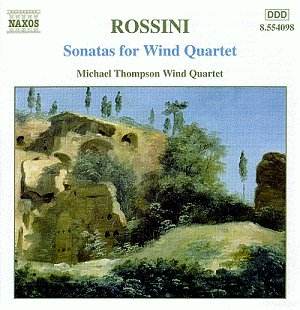These are not newly discovered Rossini works, but arrangements
of his youthful, popular String Sonatas by a contemporary, Frederic
Berr. When I say youthful, I really mean it; they were written in 1804,
when the composer was barely twelve years old. Rossini was later to
recall that "they were all composed and copied in three days",
and he went on to describe them as "horrendous…composed by me at
a most youthful age, when I hadn’t even had a lesson in thorough-bass".
Even so, he obviously retained a fondness for them, and five of the
six were published in Milan around 1825/26.
If the record catalogue is anything to go by, the pieces
are still as popular as ever, and there are some dozen or so versions
available, admittedly mainly arranged for full string complement rather
than four soloists, but still highly effective. The present versions
for wind quartet work just as well.
Although details are sketchy, it seems Rossini first
encountered Berr when the former was in Paris in June 1825 to conduct
the French premiere of his opera Il viaggio a Reims. Berr was
the clarinettist in that performance, and it has even been suggested
that his playing influenced the air and variations for clarinet that
appear in the ballet sequence.
Berr had a long pedigree as a wind player and arranger,
and this shows in his skilful handling of the four instruments. Although
he obviously uses Rossini’s notes, the voicing of the individual string
parts for winds is very convincing. When one remembers of how the composer
himself wrote for the wind section (think of any of the overtures),
it is difficult to imagine him doing any better a job than Berr, the
results being so idiomatic.
The music itself is full of what we consider quintessential
Rossini; wit, speed, elegance, numerous memorable tunes and infectious
high spirits. On first hearing, one might be forgiven for mistaking
the pieces for Mozart, and that is meant as a compliment. There is a
classical poise which, given the fairly rigid fast-slow-fast ternary
structure of each sonata, constantly recall the Viennese masters. But
even at such a young age, genius will out, and one can hear the operatic
maestro to come, especially in the andante slow movements and brisk
rondo finales.
One can sample almost at random to hear these characteristics;
I was particularly taken with the slow movement of the Third Sonata,
with the gorgeous flute playing of the ex-LPO flautist Jonathan Snowden
a real delight. Indeed, the playing throughout is exemplary; Michael
Thompson has recorded quite a bit for Naxos, most notably a superb disc
of the Mozart Horn Concertos, but the tonal blend and tightness
of ensemble is as good as I’ve heard anywhere.
Keen–eyed readers may wonder where the Sixth Sonata
has come from, given that it was only published in the 20th
Century. In fact Berr used an existing Andante (and theme and variations),
possibly from an opera score, to make the number up to a customary six
for his own set. It works perfectly well, and is remarkably consistent
with the other ‘genuine’ articles.
An enjoyable disc, then, well recorded and informatively
annotated, and certainly a must for all Rossinians.
Tony Haywood


